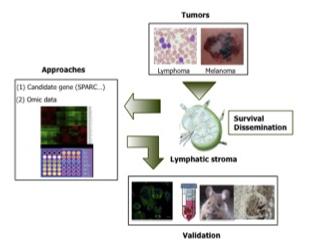
| Team 11 : Sophie Tartare-Deckert | ||||
| MICROENVIRONMENT, SIGNALLING AND CANCER | ||||
| Previous activities | ||||
|
||||
| Major Publications | ||||
|
2015 Tichet M, Prod'Homme V, Fenouille N, Ambrosetti D, Mallavialle A, Cerezo M, Ohanna M, Audebert S, Rocchi S, Giacchero D, Boukari F, Allegra M, Chambard JC, Lacour JP, Michiels JF, Borg JP, Deckert M, Tartare-Deckert S. Tumour-derived SPARC drives vascular permeability and extravasation through endothelial VCAM1 signalling to promote metastasis. Nat Commun. 2015 Apr 30;6 Prod'Homme V, Boyer L, Dubois N, Mallavialle A, Munro P, Mouska X, Coste I, Rottapel R, Tartare-Deckert S, Deckert M. Cherubism allele heterozygosity amplifies microbe-induced inflammatory responses in murine macrophages. J Clin Invest. 2015 Apr 1;125(4):1396-400 2013 Larbret F, Dubois N, Brau F, Guillemot E, Mahiddine K, Tartare-Deckert S, Verhasselt V, Deckert, M. Technical Advance: Actin CytoFRET, a novel FRET flow cytometry method for detection of actin dynamics in resting and activated T cell. J Leukoc Biol. 2013 Jun 26. 2012 Deckert, M. and Tartare-Deckert, S. Senescence escape in melanoma: role of spleen tyrosine kinase Syk. In Tumor dormancy and cellular quiescence. Editor M. A. Hayat. Springer Science. (in press). Fenouille, N., Tichet, M., Dufies, M., Pottier, A., Mogha, A., Soo, J. K., Rocchi, S., Malavialle, A., Khammari, A., Lacour, J-P., Galibert, MD., Ballotti, R., Deckert, M. and Tartare-Deckert, S. The epithelial-mesenchymal transition (EMT) regulatory factor Slug (SNAI2) is a downstream target of SPARC and AKT in promoting melanoma cell invasion. PLoS One. 2012. 7(7):e40378. Epub 2012 Jul 20. Puissant, A., Dufies, M, Fenouille, N, Ben Sahra, I., Jacquel, A., Robert, G., Cluzeau, T., Deckert, M., Tichet, M., Cheli, Y., Cassuto, J. P., Raynaud, S., Legros, L., Pasquet, J. M., Mahon, F. X., Luciano, F and Auberger, P. Imatinib triggers mesenchymal-like conversion of CML cells associated with increased aggressiveness. J Mol Cell Biol, 2012. Aug;4(4):207-20. Epub 2012 Mar 31. Cheli Y, Giuliano S, Fenouille N, Allegra M, Hofman V, Hofman P, Bahadoran P, Lacour JP, Tartare-Deckert S, Bertolotto C, Ballotti R. 2012. Hypoxia and MITF control metastatic behaviour in mouse and human melanoma cells. Oncogene, 2012 May 10;31(19):2461-70. doi: 10.1038/onc.2011.425. Epub 2011 Sep 26 2011 Fenouille, N., Puissant, A., Tichet, M., Zimniak, G., Abbe, P., Mallavialle, A., Rocchi, S., Ortonne, J.-P., Deckert, M., Ballotti, R., and Tartare-Deckert, S. 2011. SPARC functions as an anti-stress factor by inactivating p53 through Akt-mediated MDM2 phosphorylation to promote melanoma cell survival. Oncogene, Dec 8;30(49):4887-900. Colacios C., Casemayou A., Dejean A.S., Gaits Iacovoni F., Pedros C., Bernard I., Lagrange D., Deckert M., Lamouroux L., Jagodic M., Olsson T., Liblau R.S., Gilbert J. Fournié, G.J., and Saoudi A. 2011. The p.Arg63Trp polymorphism controls Vav1 functions and Foxp3 regulatory T cells development. J Exp Med, Oct 24;208(11):2183-91. Levaot N., Dimitriou, I. Sircoulomb, F., Voytyuk, O, Chandrakumar, A., Deckert, M., Krzyzanowski, P.M., Scotter, A., Gu, S., Janmohamed, S., Cong, F., Simoncic, P.D., Ueki, Y., La Rose, J., and Rottapel. R. 2011. Loss of Tankyrase-mediated destruction of 3BP2 is the underlying pathogenic mechanism of cherubism. Cell, Dec 9;147(6):1324-39. Tomic, T., Botton, T., Cerezo, M., Robert, G., Luciano, F., Puissant, A., Gounon, P., Allegra, M., Bertolotto, C., Bereder, J-M, Tartare-Deckert, S., Bahadoran, P., Auberger, P., Ballotti, R., and Rocchi, S. 2011. Metformin inhibits melanoma development through autophagy and apoptosis mechanisms. Cell Death Dis, Sep 1;2:e199. doi: 10.1038/cddis.2011.86. [Epub ahead of print]. Essafi, M., Baudot, A., Mouska, X., Cassuto, J., Ticchioni, M., and Deckert, M. 2011. Cell permeant TAT-FOXO3a fusion proteins induce leukemic cell death. Mol. Cancer Ther. Jan;10(1):37-46. Fenouille, N., Robert, G., Tichet, M., Puissant, A., Dufies, M., Rocchi, S., Ortonne, J.-P., Deckert, M., Ballotti, R., and Tartare-Deckert, S. 2011. The p53/p21(Cip1/Waf1) pathway mediates the effects of SPARC on melanoma cell cycle progression. Pigment Cell Melanoma Res. Feb;24(1):219-32. Botton, T., Puissant, A., Cheli, Y., Tomic, T., Giuliano, S., Fajas, L., Deckert, M., Ortonne, J.P., Bertolotto, C., Tartare-Deckert, S., Ballotti, R., and Rocchi, S. 2011. Ciglitazone negatively regulates CXCL1 signaling through MITF to suppress melanoma growth. Cell Death Differ, Jan;18(1):109-21. 2010 Fenouille N, Puissant A, Dufies M, Robert G, Jacquel A, Ohanna M, Deckert M, Pasquet JM, Mahon FX, Cassuto JP, Raynaud S, Auberger*, P. and Tartare-Deckert*, S. 2010. Permanent activation of the Fyn/Erk axis mediates Imatinib resistance in Chronic Myelogenous Leukemia cells through increased expression of intracellular SPARC. Cancer Res. 2010 Dec 1;70(23):9659-70. *Equal contribution. Puissant, A., Robert, G., Fenouille, N., Luciano, F., Cassuto, J.P., Raynaud, S., and Auberger, P. 2010. Resveratrol promotes autophagic cell death in chronic myelogenous leukemia cells via JNK-mediated p62/SQSTM1 expression and AMPK activation. Cancer Res. 70, 1042-52. 2009 Bailet, O., Fenouille, N., Abbe, P., Robert, G., Rocchi, S., Gonthier, N., Denoyelle, C., Ticchioni, M., Ortonne, J.P., Ballotti, R., Deckert, M., and. Tartare-Deckert, S. 2009. Spleen tyrosine kinase functions as a tumor suppressor in melanoma cells by inducing senescence-like growth arrest. Cancer Res. 69, 2748-56. Baudot, A.D., Jeandel, P.Y., Mouska, X., Maurer, U., Tartare-Deckert, S., Raynaud, S.D., Cassuto, J.P., Ticchioni, M., and Deckert, M. 2009. The tyrosine kinase Syk regulates the survival of chronic lymphocytic leukemia B cells through PKCdelta and proteasome-dependent regulation of Mcl-1 expression. Oncogene. 28, 3261-73. Botton, T., Puissant, A., Bahadoran, P., Annicotte, J.S., Fajas, L., Ortonne, J.P., Gozzerino, G., Zamoum, T., Tartare-Deckert, S., Bertolotto, C., Ballotti, R., and Rocchi, S. 2009. In vitro and in vivo anti-melanoma effects of ciglitazone. J Invest Dermatol. 129, 1208-18. Essafi-Benkhadir, K., Grosso, S., Puissant, A., Robert, G., Essafi, M., Deckert, M., Chamorey, E., Dassonville, O., Milano, G., Auberger, P., and Pages, G. 2009. Dual role of Sp3 transcription factor as an inducer of apoptosis and a marker of tumour aggressiveness. PLoS One. 4, e4478. Grosso, S., Puissant, A., Dufies, M., Colosetti, P., Jacquel, A., Lebrigand, K., Barbry, P., Deckert, M., Cassuto, J.P., Mari, B., and Auberger, P. 2009. Gene expression profiling of imatinib and PD166326-resistant CML cell lines identifies Fyn as a gene associated with resistance to BCR-ABL inhibitors. Mol Cancer Ther. 8, 1924-33. Marchetti, S., Gamas, P., Belhacene, N., Grosso, S., Pradelli, L.A., Colosetti, P., Johansen, C., Iversen, L., Deckert, M., Luciano, F., Hofman, P., Ortonne, N., Khemis, A., Mari, B., Ortonne, J.P., Ricci, J.E., and Auberger, P. 2009. The caspase-cleaved form of LYN mediates a psoriasis-like inflammatory syndrome in mice. Embo J. 28, 2449-60. |
||||
 |
||||
| Home | Top of Page | Publications | ||
| Team leader | ||||||
|---|---|---|---|---|---|---|
|
||||||
| tartare@unice.fr | ||||||
| Researcher | ||||||
| Clinical researcher | ||||||
| Postdoc | ||||||
| Student | ||||||
| Research assistant | ||||||
|
||||||
 The tumor microenvironment regulates cancer progression through complex and dynamic interactions between tumor cells, activated stromal cells and components of the extracellular matrix, creating a co-evolving ecosystem. Stromal cells usually include tumor-associated fibroblasts, endothelial cells, and infiltrating inflammatory and immune cells. The communication between cancer cells and its stroma in a tumor not only alter the biological properties of the cancer cell, but also of the different cells in the stroma, promoting tumor growth, metastasis and resistance to therapeutics. Understanding how the tumor ecosystem fosters malignant growth, invasion and metastasis cascade should open up new avenues for stroma-targeted therapies for cancer. Our laboratory is interested in the crosstalk between cancer cells and their stroma within the lymph node microenvironment in two tumor models, melanoma, an aggressive clinical form of skin cancers and lymphoma. The lymph node is the first locus of expansion for invasive melanoma cells and one of the natural niches of malignant B-cells.
The tumor microenvironment regulates cancer progression through complex and dynamic interactions between tumor cells, activated stromal cells and components of the extracellular matrix, creating a co-evolving ecosystem. Stromal cells usually include tumor-associated fibroblasts, endothelial cells, and infiltrating inflammatory and immune cells. The communication between cancer cells and its stroma in a tumor not only alter the biological properties of the cancer cell, but also of the different cells in the stroma, promoting tumor growth, metastasis and resistance to therapeutics. Understanding how the tumor ecosystem fosters malignant growth, invasion and metastasis cascade should open up new avenues for stroma-targeted therapies for cancer. Our laboratory is interested in the crosstalk between cancer cells and their stroma within the lymph node microenvironment in two tumor models, melanoma, an aggressive clinical form of skin cancers and lymphoma. The lymph node is the first locus of expansion for invasive melanoma cells and one of the natural niches of malignant B-cells. 
